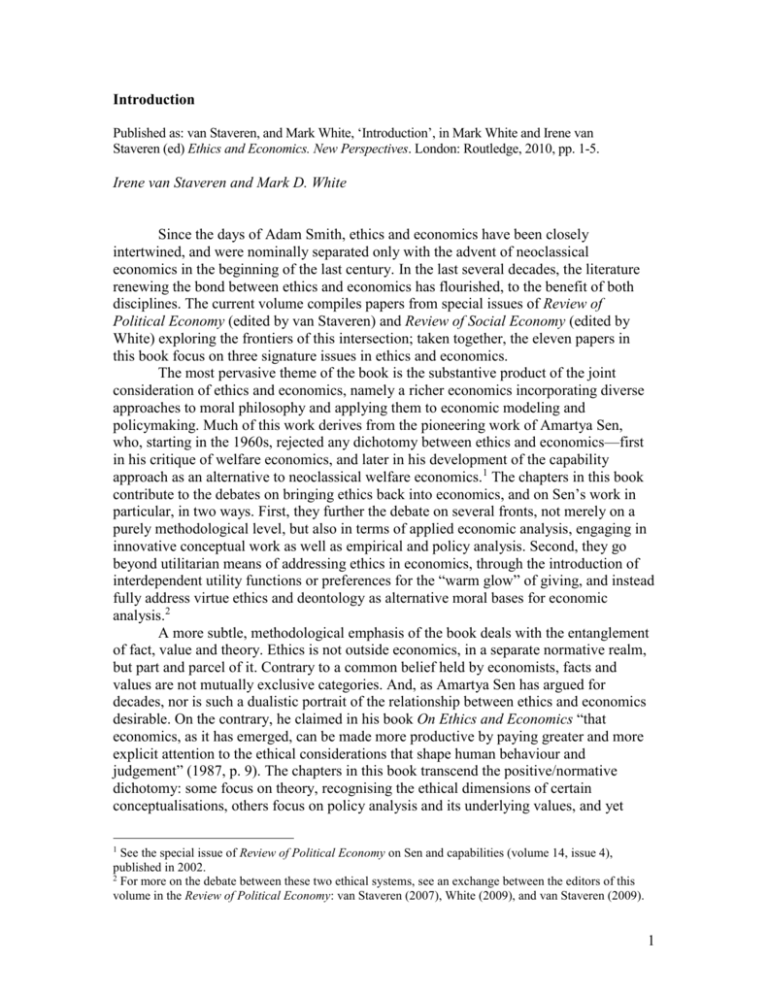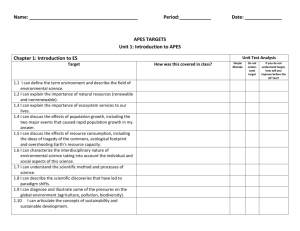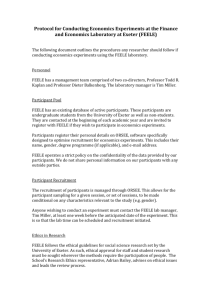Introduction to the special issue on ethics
advertisement

Introduction Published as: van Staveren, and Mark White, ‘Introduction’, in Mark White and Irene van Staveren (ed) Ethics and Economics. New Perspectives. London: Routledge, 2010, pp. 1-5. Irene van Staveren and Mark D. White Since the days of Adam Smith, ethics and economics have been closely intertwined, and were nominally separated only with the advent of neoclassical economics in the beginning of the last century. In the last several decades, the literature renewing the bond between ethics and economics has flourished, to the benefit of both disciplines. The current volume compiles papers from special issues of Review of Political Economy (edited by van Staveren) and Review of Social Economy (edited by White) exploring the frontiers of this intersection; taken together, the eleven papers in this book focus on three signature issues in ethics and economics. The most pervasive theme of the book is the substantive product of the joint consideration of ethics and economics, namely a richer economics incorporating diverse approaches to moral philosophy and applying them to economic modeling and policymaking. Much of this work derives from the pioneering work of Amartya Sen, who, starting in the 1960s, rejected any dichotomy between ethics and economics—first in his critique of welfare economics, and later in his development of the capability approach as an alternative to neoclassical welfare economics.1 The chapters in this book contribute to the debates on bringing ethics back into economics, and on Sen’s work in particular, in two ways. First, they further the debate on several fronts, not merely on a purely methodological level, but also in terms of applied economic analysis, engaging in innovative conceptual work as well as empirical and policy analysis. Second, they go beyond utilitarian means of addressing ethics in economics, through the introduction of interdependent utility functions or preferences for the “warm glow” of giving, and instead fully address virtue ethics and deontology as alternative moral bases for economic analysis.2 A more subtle, methodological emphasis of the book deals with the entanglement of fact, value and theory. Ethics is not outside economics, in a separate normative realm, but part and parcel of it. Contrary to a common belief held by economists, facts and values are not mutually exclusive categories. And, as Amartya Sen has argued for decades, nor is such a dualistic portrait of the relationship between ethics and economics desirable. On the contrary, he claimed in his book On Ethics and Economics “that economics, as it has emerged, can be made more productive by paying greater and more explicit attention to the ethical considerations that shape human behaviour and judgement” (1987, p. 9). The chapters in this book transcend the positive/normative dichotomy: some focus on theory, recognising the ethical dimensions of certain conceptualisations, others focus on policy analysis and its underlying values, and yet 1 See the special issue of Review of Political Economy on Sen and capabilities (volume 14, issue 4), published in 2002. 2 For more on the debate between these two ethical systems, see an exchange between the editors of this volume in the Review of Political Economy: van Staveren (2007), White (2009), and van Staveren (2009). 1 others have an empirical orientation—rare in ethics and economics scholarship—and are fine examples of applied ethics in economics. Finally, the chapters in this book involve a rigorous emphasis on the work of moral philosophers. Much of the work on ethics and economics, particularly that which comes from economists, suffers from an imprecise conception of the ethical ideas involved. All too often, reference is made to ideas such as “fairness,” “justice,” or “ethical behavior,” but with no grounding in the voluminous philosophical literature on these topics. Sometimes such lack of precision is benign, and the intentions of the author are clear and uncontroversial. But other times, authors use the language of philosophical ethics merely to lend authority to their own personal feelings about right and wrong, without exploring the philosophical foundations of these intuitions, much less admitting this to their readers. The danger than is that readers without philosophical background themselves will take the validity of the author’s ethical presumptions as given, without realizing that they may indeed be very questionable and controversial from the viewpoint of moral philosophy. In this volume, such pitfalls have been prevented. All the chapters in this book make their ethical presuppositions, and the sources thereof, clear, which provides a more solid foundation for their ethical-economic analysis. Outline of the book The flow of the book is roughly from broad methodological issues involving economics and the proper role of markets, into topics regarding theory and modeling, and finally discussion of policy matters. The first chapter, “The ‘Dismal Science’ – Still?,” from Mark Lutz, starts from the position that much economic behaviour stems from feelings of economic insecurity. The paper draws on psychological development theory, in particular the work of Abraham Maslow, to show how “destructive economic Angst really is,” and illustrates economic insecurity with survey data. Lutz then argues that not only is insecurity created by an economic system that privileges efficiency over human welfare, but insecurity also functions as a catalyst for materialism. He supports this argument with references to empirical cross-country surveys on materialist and postmaterialist values and differences in the levels of economic security in these countries. These findings lead Lutz to point out some basic characteristics of economic theory that support an insecurity-materialism link—consumption as an end and work as an instrument, freedom being reduced to freedom to choose in markets, and an exclusive concern with allocative efficiency in welfare economics. Next, Irene van Staveren’s “Communitarianism and the Market: A Paradox” questions the dichotomous economic presuppositions held by several communitarian philosophers, such as Elizabeth Anderson, Alasdair McIntyre, and Amitai Etzioni. She criticizes the blind eye they have, except for Etzioni to some extent, for heterodox economic theories which provide alternatives for neoclassical assumptions of rationality, utility maximization, market equilibrium, etc. Van Staveren, however, argues that insights from communitarian thought can nevertheless enrich economics, precisely because they can help strengthening heterodox perspectives on economics, by making the ethical concerns underlying these perspectives more explicit and better integrated. Deirdre McCloskey’s chapter, “Not by P Alone: A Virtuous Economy,” defines “P values”—profane, price, profit, and prudence—as the means, not the ends, of 2 economic behaviour. In opposition to these, she introduces the category of “S values”— solidarity, society, and sacred—and provides illustrations of P values and S values in everyday life. This leads up to her two main points: on the one hand, McCloskey argues that mainstream economics is wrong in assuming that S values do not belong to the economy or in economics; on the other hand, she contends that critics are wrong when they assume that markets are all about P values. Markets are about both P values and S values, because they thrive on competition but also involve cooperation. McCloskey ends with a plea that economics should recognize this combination of P values and S values in its theorizing, models, and empirical analysis. Continuing the theme of virtue ethics, in “Virtue and Behavior” philosopher Jennifer Anne Baker employs the ethical theory of the Stoics, as well as the work contemporary philosopher David Schmidtz, to comment on critiques of rational choice theory from Amartya Sen, Elizabeth Anderson, and Irene van Staveren. In particular, she discusses Sen’s concept of counter-preferential commitment, and explains how Stoic ethical theory, which can answer many of Sen’s criticisms of rational choice theory. Vivian Walsh also addresses Sen’s work in his chapter, “Freedom, Values and Sen: Towards a Morally Enriched Classical Economic Theory,” in which he shows how Sen goes beyond the utilitarian ethics of rational choice theory, and also that Sen’s understanding of capabilities as freedoms helps to bring values back into the heart of economic analysis. Next, Walsh discusses the concept of justice, especially as developed by John Rawls in his A Theory of Justice, using it to make a case for descriptive richness in economic analysis, going beyond capabilities to exploring the moral implications of economic models. The next two chapters focus on issues of human dignity and agency. Inspired by the work of legal philosopher Jules Coleman, Mark D. White’s “Pareto, Consent, and Respect for Dignity: A Kantian Perspective” uses the ethics of Immanuel Kant to argue that the Pareto standard, considered unassailable by most economists and philosophers, is morally questionable due to its lack of respect for the dignity of autonomous agents, given its reliance in practice on hypothetical rather than actual consent. In “Identity and Individual Economic Agents: A Narrative Approach,” John B. Davis adds to his rich work on identity and the economic individual by emphasizing the importance of agency to ethical decision-making, incorporating the work of contemporary moral philosopher Christine Korsgaard on the “reflective structure of consciousness.” Appropriate for the 250th anniversary of the publication of The Theory of Moral Sentiments, Jonathan Wight looks at Adam Smith’s moral philosophy in “Adam Smith on Instincts, Affection, and Informal Learning: Proximate Mechanisms in Multilevel Selection.” Wight argues that Smith’s work on natural instincts (such as emotions and imagination) can contribute to current discussions of multilevel section, informal learning, and human and social capital, and at the same time can provide a more accurate picture of Smith’s “invisible hand” at work. The last three chapters provide examples of applied ethics in economic analysis. First, Mozaffar Qizilbash’s “Two Views of Corruption and Democracy” discusses two opposing views of how democracy affects corruption. The pessimistic view, supported by neoclassical economics, holds that the egalitarianism of democracy will stimulate corruption because the majority want the benefits of state provisions and elected politicians will implement the necessary redistribution away from the losing minority. 3 The optimistic view, put forward by Sen, contends that democracy tends to reduce selfinterest and increase values of solidarity, in turn weakening tendencies toward rentseeking and free riding. Qizilbash finds the optimistic view more compelling, but admits that Sen’s optimism needs some institutional backing. He suggests that some forms of corruption are undemocratic, and concludes that in the struggle against corruption, we need to strengthen democracy rather than give up on it. In “From ‘Hume’s Law’ to Problem- and Policy-Analysis for Human Development,” Des Gasper evaluates the humanist values underlying Sen’s (and related economists’) policy analysis. The central question underlying policy analysis is ‘how do and can people live?’, which, obviously, is an ethical question. The paper challenges Hume’s Law—“no ought can be derived from an is”—and refers to the work of pragmatist philosophers like John Dewey, who recognize that every map of reality is selective and cannot escape from our views and interests. For example, Gasper notes the limitations of the technical definition of “public goods” in neoclassical economics as nonrivalrous and non-excludable goods. Education and health care are often rivalrous and excludable, yet in many countries they are public goods because they are regarded as merit goods whose consumption has major positive externalities. Finally, Gasper suggests particular values that would improve policy analysis, such as realism above elegance of models, sufficiency above precision in data analysis, and human rights as a guiding force. Finally, Stephan Klasen’s chapter, “The ‘Efficiency’ of Equity,” shows how recent empirical analysis of the equity-efficiency nexus undermines the positive/normative divide long cherished in the discipline. To this end, the paper discusses three strands of empirical literature. First, experimental economics shows that people often do act out of moral motives rather than narrow self-interest. Second, research on subjective well-being provides evidence for what Veblen recognized a century ago, namely that relative income differences are more important for people than absolute differences. This literature also shows that the penalty of inequality is substantial and leads to large losses in well-being. Finally, the macroeconomic literature on the relationships between inequality and growth shows how growth is negatively affected by various forms of inequality. Based on these analyses, Klasen argues that one cannot undertake positive economic analysis and focus on issues of efficiency without considering issues of equity as well. REFERENCES Sen, A. (1987) On Ethics and Economics (Oxford: Basil Blackwell). Van Staveren, I. (2007) “Beyond utilitarianism and deontology: ethics in economics,” Review of Political Economy, 19 (1), pp. 21-35. Van Staveren, I. (2009) “Response to Mark D. White,” Review of Political Economy, in press. White, M.D. (2009) “In Defense of Deontology and Kant: A Reply to van Staveren,” Review of Political Economy, in press. 4








